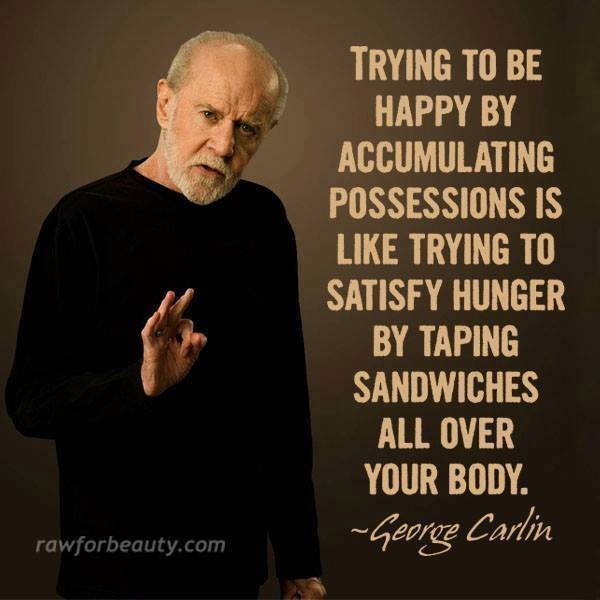I won’t spend more than $50 on a purse – and even that’s a bit steep. Why? I don’t care whose name is on it, as long as I like it. A store I worked at often stocked Fendi and Prada accessories, and I couldn’t understand the logic behind spending $500 on a purse and $350 on the matching wallet
“I just got your last wallet! squealed a female customer. “Oh my God, I hope this fits on my credit card.”
What?! Why??
Do you know how many purses I can buy with $500? Do you know how often brand names knock-off other brand names? (I had a sweater that said PBADA on it. The B was conveniently mistaken for an R… Price: $19.99). My no-name, $20 purse gets more compliments from random strangers than my expensive Guess purse (seriously, random strangers – cashiers, manicurists, people walking down the street, nurses).
So what’s behind the desire to buy the latest styles, technologies, and accessories? The easy answer is materialism. But it’s not necessarily the complete answer.
I asked people who were part of Queendom’s values research study on the following question: “How important are material things to you?” I then compared materialists (i.e. material things are extremely important) to non-materialists on different value systems. Here’s what my statistics showed:
(Note: We had six main values which we broke down into sub values. If you want to assess your value system, you can take our test here.)
Main Value: Social – Sub Value: Socializing
A person with this value takes pleasure in being in the company of others – much more than being alone. They thrive on conversation, company, and the social scene.
Score for materialists (on a scale from 0 to 100): 70
Score for non-materialists: 65
Main Value: Social – Sub Value: Acceptance/Belonging
Pretty straightforward; a person with this value wants to feel like they are a part of a group. They value popularity, but also approval and validation from others. Hmmm I’m starting to see why getting a fashionable purse is a good start…
Score for materialists (on a scale from 0 to 100): 67
Score for non-materialists: 64
Main Value: Social – Sub Value: Altruism
Someone who values altruism is greatly concerned about the needs of others, and really wants to make the world a better place. Take note – the scores are now reversed here.
Score for materialists (on a scale from 0 to 100): 71
Score for non-materialists: 76
Main Value: Realistic – Sub Value: Entitlement
Those with strong Realistic values in general understand the importance of hard work and will even go above and beyond the call of duty to get things done. But they’re not fools. They value equal recompense. If they’re going to sweat and bleed for you, they want to be rewarded because they feel they’ve earned it and are entitled to it.
Score for materialists (on a scale from 0 to 100): 63
Score for non-materialists: 53
Main Value: Political – Sub Value: Power
Those who value power want to assert a certain influence over others. They want to dictate how things are done and refuse to take a backseat to anyone. So that BMW and that high-end purse stand for something. They make a bold statement. I had a pair of flip-flops with the words “If you have to ask, you can’t afford me” written on the inside. I’ll tell you this: it got people’s attention. What I won’t tell my flip-flop admirers is that I paid $4.99 for them.
Score for materialists (on a scale from 0 to 100): 56
Score for non-materialists: 41
Main Value: Political – Sub Value: Career Life
Professional success means a lot to people with this value. They want to be able to take pride in their career and their accomplishments.
Score for materialists (on a scale from 0 to 100): 62
Score for non-materialists: 54
Main Value: Political – Sub Value: Recognition
Those with this value want to be appreciated for their hard work, and thrive on the respect that comes with it. Recognition can be both tangible (money, rewards) or intangible (praise).
Score for materialists (on a scale from 0 to 100): 53
Score for non-materialists: 41
Queendom’s research also shows that those who consider material things important also score higher than non-materialists on competitiveness, pride, self-interest, and self-importance.
So does this mean that wanting lots of pretty and expensive things makes you a “bad” person? Not at all. But it’s important to understand the motivation behind a desire for material things. Buy them because you want to treat yourself. Buy them because you’ve worked hard and deserve a reward. Don’t buy them because you think you’re a nobody without them.

Insightfully yours,
Queen D


